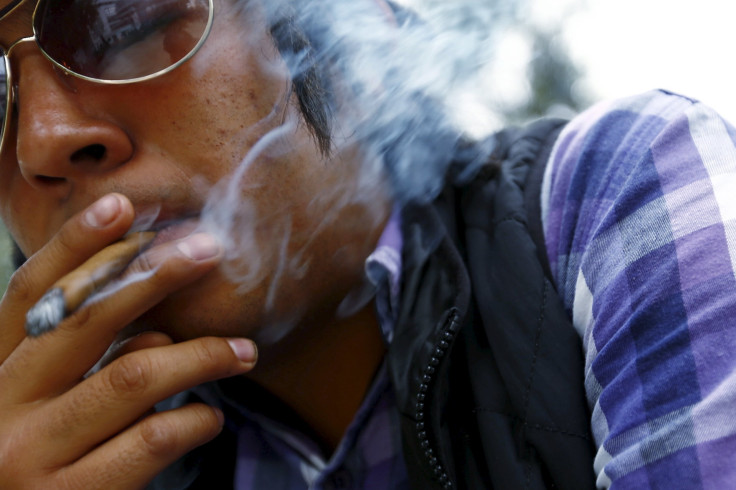Marijuana Use Linked To A Prediabetes Diagnosis In Middle Age: Study

A new study finds people who have smoked pot more than 100 times are significantly more likely to have prediabetes when they reach middle age. Prediabetes means your blood sugar is higher than normal, says the Mayo Clinic, though not as high as a type 2 diabetes diagnosis. While prediabetes can progress to diabetes, the new study surprisingly does not draw a link between marijuana use and diabetes.
There may be "multiple potential explanations" why the study results connect the dots from marijuana to prediabetes but not diabetes, Michael Bancks, lead author of the study and a Ph.D. student at the University of Minnesota School of Public Health, told Medical Daily. Quite simply, the study may reflect a false association between prediabetes and marijuana-use, he said. Or the unusual outcome may be indicative of the fact that the researchers had to exclude some people with higher levels of drug use and a greater likelihood of developing diabetes “due to missing information on important factors.”
“Or marijuana use may have a more noticeable impact on glucose metabolism in the prediabetes range compared with the diabetes range,” added Bancks. While inhaling marijuana is the most common way to use the drug, he cautioned that his study did not specify method of use, which may also impact the effects of this drug.
How Will Marijuana Legalization Affect Health Trends?
In 2012, an estimated 18.9 million Americans 12 years old or older identified themselves as current users of marijuana, the most frequently used illicit drug in America, say the researchers. With states enacting policies to permit medicinal or recreational use, an upward trend in these numbers can be expected. So what is the health impact, specifically diabetes impact, from pot-smoking?
To answer this question, Bancks and his colleagues used data from the Coronary Artery Risk Development in Young Adults (CARDIA) study. CARDIA's purpose is to investigate risks of coronary artery disease among four urban populations: Birmingham, Ala., Chicago, Ill., Minneapolis, Minn., and Oakland, Calif. Black and white adults between the ages of 18 and 30 enrolled during 1985-1986. At each examination participants updated their demographic information and also answered questioned about their medical history and lifestyle, including education, tobacco and drug use, alcohol consumption, and physical activity.
Looking at participants' answers to lifestyle questions, the researchers discovered the percentage who self-reported current marijuana-use declined over time, from 28 percent in 1985-1986 to 12 percent in 2010-2011. Next, the researchers compared pot-use and diagnosies of prediabetes and type 2 diabetes in middle age.
“We found that current users of marijuana had 65 percent greater odds of having prediabetes compared to nonusers,” said Bancks, adding that people who used marijuana more than 100 times “had 40 percent greater risk for developing prediabetes by middle adulthood compared to nonusers.”
Strangely, no association could be found between pot-smoking and full blown type 2 diabetes when participants reached year 25 of the study. Along with Banck's reasons mentioned above, the researchers noted it also was not possible to factor in whether people had stopped smoking pot for health reasons.
“Some people in ill health might choose to quit marijuana as a result of a physician’s recommendation … or a general concern for their health,” speculated the authors, “or because of more complicated associations between poor health, income, and drug access.” Possibly illicit drugs, per se, “might not cause a decline in metabolic health,” they added, but it might “cause declines in overall health.”
Prediabetes
"Everyone with prediabetes is at increased risk of developing type 2 diabetes, but it varies from individual to individual based on age and exactly where they are in the prediabetes range," Matt Peterson, managing director of medical information of the American Diabetes Association, told Medical Daily. If you have prediabetes and do nothing to correct the condition, you will likely progress to diabetes in 10 years or less, according to Mayo Clinic. Peterson said just about "half of people who are told they have prediabetes say they make lifestyle changes to reduce their diabetes risk."
While prediabetes usually has no symptoms, signs that you are developing type 2 diabetes include increased thirst, frequent urination, fatigue, and blurry vision. Diabetes ultimately damages your heart and circulatory system.
Going forward, Bancks has no immediate plans to continue this research since his dissertation focuses on whether and how cardiovascular health, brain structure, and mental abilities intersect. However, he said, “the increased legalization and use of marijuana will draw more attention from researchers” so naturally in the years to come more will be learned about the health effects of marijuana.
Source: Bancks MP, Pletcher MJ, Kertesz SG, et al. Marijuana use and risk of prediabetes and diabetes by middle adulthood: the Coronary Artery Risk Development in Young Adults (CARDIA) study. Diabetologia. 2015.



























